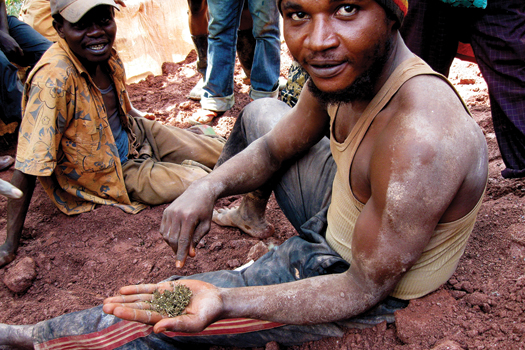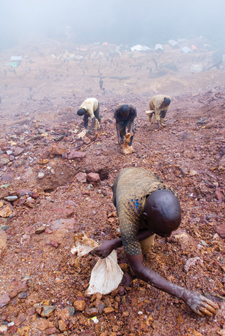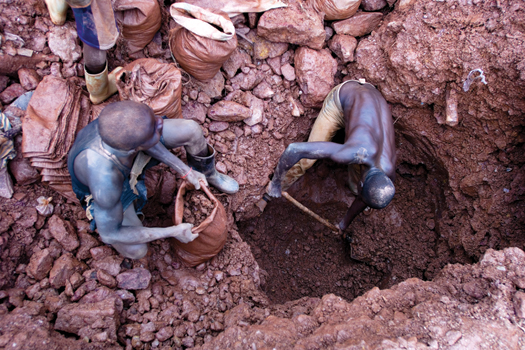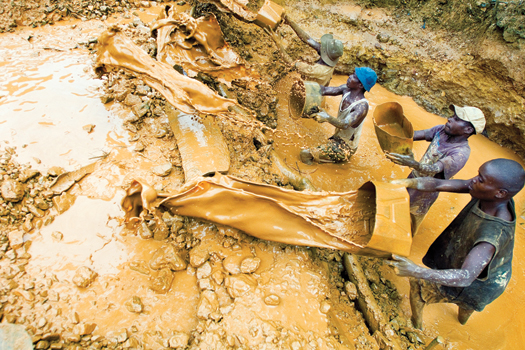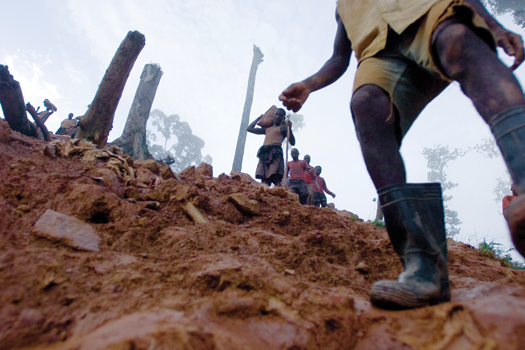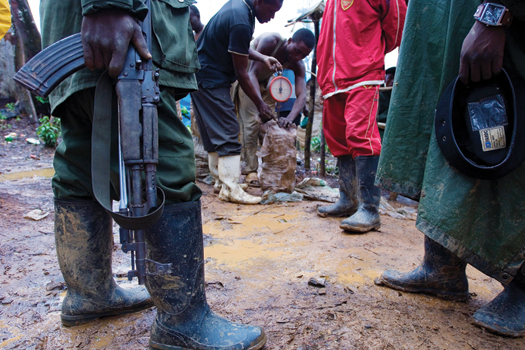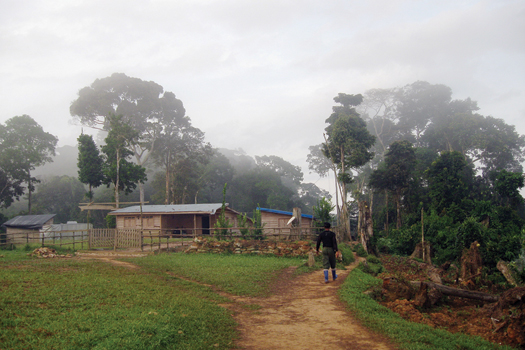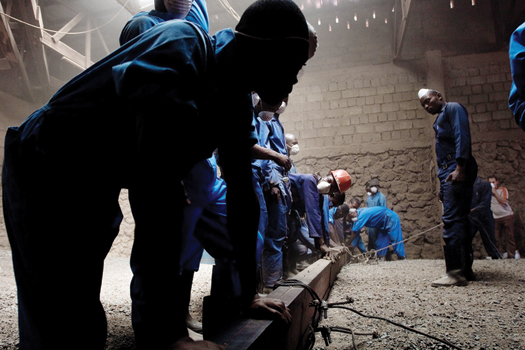-
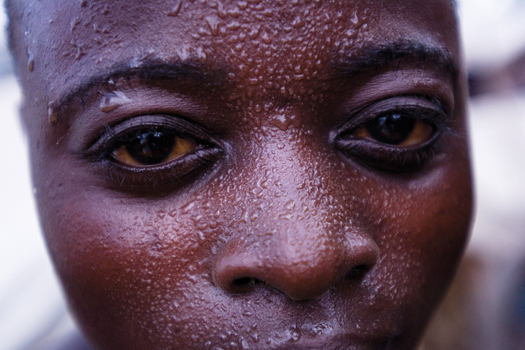
- Mark Craemer
- Sweat beads on the brow of one of the more than two thousand artisanal miners at Bisie, a cassiterite mine in the North Kivu province of the Democratic Republic of Congo.
In the first shafts of light to pierce the jungle canopy, the tin porters danced. They swayed and sashayed to the languorous rhythms coming from a radio that someone, in the night, had thought to stash under a bag of beans. The rest, an hour earlier, had been looted—the other radios, flashlights, pocketfuls of cash, half of Adolphe’s precious stock of sardine tins, and two porters to transport it all, nudged forward with assault rifles into the moonless oblivion of the jungle.
We were camped—Adolphe, the tin porters, my guide Ferdinand, and I—in a handful of patched-up tents standing in a clearing that serves as a rest stop midway along a twenty-six-mile, mud-churned footpath through a sliver of rainforest in the eastern Democratic Republic of Congo. Onward, still a half-day’s hike away, loomed Bisie, richest of the east’s tin-ore mines—a lodestone for salivating prospectors and graft-minded brawn from the Congolese Army or any of at least six rebel factions that prowl the surrounding forest. The predatory refuse of the 1994 genocide in tiny, neighboring Rwanda and a five-year war in Congo that nominally ended in 2003, these factions periodically splinter, fritter away into Eastern Congo’s untapped immensity, then regroup into new alliances. On marauding and ransom depends their longevity.
But eight hours of clambering over hip-high roots, slashing through vines, and wading across mud lagoons had a way of drowning out anxieties. Exhausted, lulled by a symphony of jungle creatures and the soft song of porters huddled round campfires, I sank into a dreamless sleep.
Sometime in the night, gruff, staccato shouts jolted me awake.
“Muzungu! Muzungu!”
The word in Swahili means “the white”—and I was the only white person for miles around. I peered out of my tent. A flashlight shone into my eyes. I groped for mine, flashed it back, and caught the contours of a man in army green, tall and lean with a semiautomatic slapping against his shoulder.
It was 4:45 a.m. and a gang from the country’s dysfunctional army was blasting through the campsite like a tornado.
I listened silently to negotiations for what I presumed was a bid for my body. I fingered my penknife, aware of the absurdity of wielding it to fend off a man three times my strength and armed with a Kalashnikov. Beside me Ferdinand spoke gently in a language that I didn’t understand. By luck—or God’s grace, as he would say—he recognized the soldier’s accent as that of his own tribe and offered him a crisp twenty-dollar bill and a compassionate ear for a tale of poor soldiers—unpaid and without prospects, ordered from the mine to the front—in exchange for leaving me be.
The soldier vanished with the money, boasting that I was a VIP.
Another man wanted Adolphe’s black gum boots too, but Adolphe told them they were no good—leaked water, full of holes. He steered them away with some cash, he told me later when he crawled into my tent. It was all the money he’d earned from selling sardines—money he’d saved so he could leave this land of dog-eat-dog and pay his way back to the city, where he’d find an honest job that wouldn’t make him hemorrhage inside.
Adolphe belonged now to the tent city, one among the 1.2 million Congolese caught in a limbo of homelessness and wandering by a conflict fought mainly between boys with rusty, secondhand weapons, and propelled by the usual, interlocking motives: power, revenge, mutual suspicion, manipulated ethnic loyalties, and economic fiefdoms hacked out of a jungle second in size only to the Amazon.
He had joined us that day along the trail, his tale blurring with the passing scenery. His parents had been slaughtered for speaking Kinyarwanda, a language associated with Rwanda whose speakers had twice in the past decade invaded from the east. He had lived for a time in a refugee camp in Uganda, lost track of his lone surviving brother, then headed to Goma, the slapdash provincial capital of the warring region of North Kivu. But the city offered few prospects for employment, even for a twenty-one-year-old with a college degree in information technology. So he had headed through the jungle, to Bisie, to try his luck with mining.
“We’re not all illiterate, you know,” he had pointed out that morning to Gaston, another mine-bound itinerant, as the pair sprawled for a moment on a felled tree along the path. “Some of us have diplomas.”
In the dark tent that night, his hand trembled with the sorry remnants from his pocket: a couple of crumpled fifty-franc Congolese bills, worth a few US cents, and a packet of pills. He took them to staunch the bleeding that began during an ill-fated trek from the mine—a two-day voyage through the forest—while bearing the standard 110-pound load of tin ore. After the burden had torn his abdominal wall, he had opted for selling cans of fish. A few more sales, he estimated, and he would have had the forty dollars he needed to pay his way back to the city.
For all that, when dawn came, the porters danced. Amid scattering chickens and the shifting haze from vats of boiling maize porridge, they melted into the voluptuous, sun-drenched melodies of their soukous. They swayed as if they were rising above the smashed dreams that paved the pathway to Bisie and its vain promise of quick riches. To be robbed of the lone objects on which their livelihoods depended—a pickaxe, five cans of sardines, a flashlight for entering the bowels of a mineshaft—might have been a death sentence. But the porters treated their loss with an almost transcendental sense of their own insignificance. If you have nothing left but the clothes on your back, and no prospects of redress because you live in a land of near-total impunity, what else can you possibly do but dance?
From the mine, porters streamed back along the trail with bundles balanced on their heads or slung across their backs or in wooden sleds. Sweat beaded on their foreheads, poured down their torsos and congealed as a stench that blew around them like a cloud. Bent double, they channeled the pain of the weight into a coiled concentration, muscles tensed, brows furrowed, bolting forward.
Because if they stop, they stop.
The wet hump of a fresh grave lay feet from a crook in the path, barely visible among the roots and rotting tree stumps. A few leaves crowned it like a garland. His name was Emmanuel. He had borne 132 pounds; he had weighed only 100. In that spot, he had perched a moment to rest, unloaded his burden, and let the soft, damp soil lull him to sleep. He never awoke. They came and picked up his load of tin, took his two hundred dollars, and left the task of his burial to the manager of the rest stop. At the sight of the hump, Adolphe let out a primal cry.
It wasn’t supposed to be like this. There was supposed to be another way through the jungle, one involving wheels and paved road so human beings would not die like pack animals hauling sacks of unrefined metal on marathon jungle treks.
In 2004, on the London Metal Exchange, prices shot up for a conductive metal called cassiterite, a mineral that is the principal ore of tin. Sales of the raw mineral would now outstrip the costs of industrial extraction, even of deposits buried in the anarchic jungles of a failed state.
Only four years earlier there had been a sudden spike in the price of coltan, a rare mineral so abundant in some regions of Congo that one had only to scratch barehanded at the soil to find a thick, black lump. Amid a surge in demand for cell phones, PlayStations and other electronic gadgetry, coltan shot up from $30 a pound to $240. And so they swarmed—Rwandans, Ugandans, children, rebels—into the forest, and into the heart of a conflict that at one point drew combatants from nine neighboring countries. Boomtowns rose. Brute capitalism flickered to life among fragile new social hierarchies in the legions of profiteers and prospectors.
-
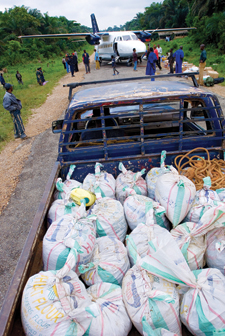
- Mark Craemer
- Bags of tin ore are carried by porters from Bisie then loaded on trucks and driven to waiting planes in Walikale.
Then reports started emerging of “blood coltan” and its lethal lubrication of what came to be called Africa’s World War. By 2001, an alternative supply flooded the global marketplaces. Prices nosedived. The boomtowns rotted in the tropical heat. It all suddenly seemed so ephemeral.
Six years later, as the world poured money into Congo’s first “free and fair” elections in forty years, multinational mining companies perched on the sidelines, waiting for the chance to bid on national mining concessions that were frozen in a post-conflict attempt at a cleanup.
Mining and Processing Congo (MPC), a subdivision of a company partly owned by a South African private-equity firm, unleashed a savvy local weapon on government ministers. Yves K was a paunchy Belgian-born freelance pilot who had earned the wartime epithet of the White Mai Mai for flying out supplies to scattered pockets of Mai Mai (defense militias nominally loyal to then-President Laurent Kabila and named for the water amulets they wore to ward off bullets). He still enjoyed flashing his VIP pass to cut through the usual bureaucratic walls that most Congolese bypass only with graft. When the Ministry of Mines opened anew for business, the White Mai Mai emerged within hours with the legal rights to the mining concessions at Bisie.
Then MPC went a step further. Under the customary laws of the Congo, property rights to the mountain fell to two local clans. A dele-gation of MPC bigwigs choppered into the villages outside the forest and signed contracts with about a dozen representatives of Bisie’s two proprietary families, the Bassa and Bandaluga. The deal included notarized pledges to build schools, health centers, a hydroelectric plant, and a manioc mill, and a promise to train and employ local diggers. According to clan elders and documents from the time, the residents had great hopes that MPC would pull them out of poverty. The Muzungu, they said, could help them in a way that their own could not.
According to its director general, Brian Christophers, the company planned investments in the local community worth $3 million. Peanuts, he said, compared to the profits they expected to reap.
“We had a whole development program. We even had NGOs involved. We knew already that the deposit was big enough to proceed at those levels,” Christophers told me. Bisie, in short, promised a treasure trove.
In the jungle, atop the tin-ore mountain, MPC staff set to work building a compound of simple clapboard houses and premises for a workers’ canteen. They built a helicopter landing pad. A narrow stretch of the footpath was stripped of trees and flattened into a boulevard as the promise of a road. But there, development stopped.
The colonial-era highway connecting Goma to Walikale town, the first stop on the way toward Bisie, had long ago returned to jungle, another victim of state neglect and war. A last vestigial stretch now served as an airstrip for the creaking Antonovs that daily flew the tin-oxide ore to Goma.
“There goes our cassiterite,” Brian Christophers chided as we watched from the garden of his Goma villa as planes flew overhead. Sometimes twenty, sometimes more, passed each day, he said.
With their track record of crashing under the weight of excess cargo loaded by overzealous traffickers, locals had dubbed them “flying coffins.” Their Russian or Ukrainian pilots were said to down stiff vodkas before taking off.
For a fee of $130 haggled with a broker on the tarmac, Ferdinand put his faith in God, I in his faith, and we stepped onboard. The walls inside were boarded up with wooden planks and a strange wheezing sound accompanied the rumblings of the propeller. We flew for an hour over an unbroken swell of rainforest, the merry chatter of a tin trader with Ray-Ban knockoffs and layers of gold jewelry drowned to pantomime as he demonstrated how to use his small Chinese-made weighing machine. We touched down on the road through Kikambo, sped past the moldering carcasses of two smashed Antonovs, and came to a halt between two lines of sandy-colored mud huts.
The door opened. There with his back to us stood the burly figure of Colonel Samy Matumo. And that, for my purposes, was a dazzling bit of luck. The illegal exploitation of Bisie had long been an open national secret, loudly denounced by journalists, religious leaders, and nonprofits at home and abroad. Enemy number one, mob boss, and warlord extraordinaire was its commander, known to all simply as Colonel Samy.
Dressed in the khakis of the national army’s Eighty-fifth brigade, he was directing the choreography of traffic around the plane and complaining loudly to uniformed underlings that his driver had yet to appear. With balletic precision, laborers spread the plane’s cargo along the roadside, then reloaded the plane with dozens of bags of cassiterite from a truck, and in a matter of minutes turned it about-face with a set of ropes. A second Antonov touched down on the road just as the first lifted off on its way back to Goma.
Minutes later the colonel sat in a wood-carved chair in the corner of a cool mud-walled hut. The chiaroscuro from a paneless window cut across his baby-faced features, partially obscuring his gaze. A fat gold watch hung from his wrist. He spat onto the cracked mud floor among the bones of a chicken or possibly a macaw. Three burly men in basketball jerseys and Nike outfits guarded the door. A woman passed through bearing a silver bowl filled with water and placed it by his feet. He washed his hands, then carefully scrutinized my authorization papers.
It was revelatory of the deep corruption, if not the sheer loopiness of Congolese bureaucracy, that my visit to a mine notorious for falling outside the bounds of the law required seventeen separate stamps and signatures from local, regional, and national authorities, both civil and military. The last of the signatures, before Samy’s, belonged to Colonel Delphin Kahimi, de facto commander of military operations in North Kivu province. Obtaining it had required tracking Delphin’s movements between battle sites in order to catch him on a brief return to his Goma villa. At each stop, the requisite authority would furrow his brow and carefully probe my purposes, often with an ill-concealed suspicion that I was out for a cut of the profits myself. Colonel Samy duly took his time—a languor that accented his self-importance.
I already knew. For many in Kikambo, Colonel Samy was a hero, head of a rebel brigade of former Mai Mai, sons of the territory who had defended it from the foreign invasions that followed the 1997 ouster of the country’s tyrant of thirty-two years, Mobutu Sese Seko. In subsequent peace deals, these men were to be incorporated and dispersed across Congo’s national force. But the Eighty-fifth resisted orders. Entrenched in their tin-ore-rich pocket of jungle, far from the reach of any inchoate law and order, they merely donned national-army uniforms, then skipped the training meant to turn them from rebels into soldiers.
When MPC representatives arrived at Bisie on an official visit in 2006, local residents greeted them with welcome placards and ceremonial dances. The delegation met with clan leaders and local civil-society groups, and challenged Samy’s Eighty-fifth to a friendly soccer game. The soldiers won. MPC handed over a cash gift to Samy. It all seemed hunky-dory. That night, gunfire broke out from Samy’s camp. An MPC engineer was shot in the leg and had to be helicoptered out. More death threats, assassination attempts, falsified documents, and arbitrary arrests followed. The colonel wanted a deal. He demanded that MPC offer a cut of every kilo that came out of the mine, a total that would have been worth about ten thousand dollars a month. Said Christophers, “We just looked at him.”
In parallel, a rival company to MPC, sprung from a splinter faction of the Bangandula clan, found a willing patron in a well-connected businessman in Kinshasa named Alexis Makabuza (a target of UN sanctions for alleged links to illegal arms imports). For support and a cut of the mine’s profits, the Bangandula Mining Group (GMB) turned to a web of local officials—and to Colonel Samy. A mafia boss was born.
Notarized “contracts” obtained by MPC revealed a system of kickbacks between GMB and local administrators. According to one such contract, dated August 28, 2006, the administrator of Walikale territory, Dieudonne Tshishiku Mutoke, “assures the security of [GMB’s] work throughout the expanse of the territory,” in return for 10 percent of weekly production, fifty cents for every kilo of cassiterite bought at the mine, and 50 percent of the group’s revenues in neighboring villages.
When finally, after several minutes of silence, Colonel Samy looked up from my paperwork and assented with a nod to my passage to Bisie, I asked about his control of the area. He smiled a mite bashfully and meandered through a series of non sequiturs. He talked of defending the territory from foreign militias, of God being on his side, of paying the school dues of needy children. The mine, he said, needed protection from its population of vagabonds and ex-criminals.
“All bad people are there,” he said. “As you can imagine, everywhere in Kivu there is war. Only in Walikale there is peace. God is helping authorities in the territory. For example, myself indirectly I am working for the good of ordinary people.” He stopped to pick his teeth. “I ensure the security of the whole territory.”
For a moment, I wondered if he might be sincere. Couldn’t an army unit, fattened on its own mountain of riches, act as a social service and law enforcement of sorts in the far corners of a country otherwise beyond the reach of government?
Less than forty-eight hours later—after Ferdinand had hired porters from among the young men desperately swarming the gateway to the footpath, after we had started on our twenty-six mile trek (our literal marathon) toward the mountain and bedded for the night—the soldiers blitzed us near dawn. Any hint of Samy’s good intentions vanished with the radios. After the tin porters danced, we packed our things and pressed on.
At Bisie, the jungle opened, in a blast of heat and noise, onto a labyrinthine city that sprawled to the base of a scarred, red mountain. The place suggested the transience of a fever, its shacks collapsing upon each other, slapped together from mud, corrugated iron, twigs, and bits of cloth. Vendors crammed narrow alleyways with flasks of brandy, cheap calculators, batteries, and curiosities such as men’s dress shoes. Men dipped pans into the gray waters of a stream that served for basic hygiene, for washing the guts of slaughtered animals, and for sifting for fine alluvial tin-ore dust. They poured the water into rusty troughs and guffawed at the Muzungu as we picked our way past.
Here the harlots in Colonel Samy’s private hotel cursed you if you dared defy their solicitations. Here the bush meat was smoked fresh, but the cost of other food and drink was inflated to at least six times the normal price because everything had to be hauled through the jungle, past the ten rickety wooden barriers that cracked open only for passersby who hand over withered bills or a cut of their mineral burden to thugs in dusty pinstripe pants or basketball jerseys.
At the last of the barriers, three soldiers in civilian clothing had rocked on plastic chairs under a tarp and solemnly passed my papers from one to the next. Gaston quietly handed over a stack of fifty cell phone credit units. The standard shakedown was 10 percent of all entering merchandise.
For a long while, the mine was the sole preserve of Samy, but every time MPC called upon a branch of military or officialdom to investigate, they came, they saw, and then they never left. There was a schedule of those who collected bribes at the barriers that read like a catalog of the military chain of command: on Tuesday, General Gabriele Amisi, head of ground forces; on Wednesday, the chief of staff, based in Kinshasa; on Thursday, military intelligence; on Friday, the eighth military region, responsible for North Kivu; and on Saturday, Colonel Etienne Bindu, the Goma-based chief of staff. Sundays, with only a trickle of traffic, theoretically belonged to kin of the two clans who traditionally owned the mountain. But they had been chased away by members of the firm that acted as a civilian front for Samy’s crew.
It was a Monday when we arrived, so the bouncers we paid off were soldiers from Colonel Samy’s own brigade.
A steep climb up the mountain’s face revealed a cratered Martian landscape of semi-naked miners bent double, muscles slathered in mud, hacking bare-knuckled with shovels and tiny pickaxes deep into stinking pits. They called themselves “owls,” creatures of the dark who slept, ate, and defecated deep inside tunnels from which they seldom emerged.
Sometimes they smoked their minds soft. “We have no choice but to drug ourselves,” said Alliance Nanjangi, an owl in a knitted Rasta bonnet who puffed on a giant spliff.
Gazing out onto lush forested hills veiled in shifting mists, he told me that in a previous life he had been a student. He opened his palm to show me a fistful of the mind-numbing herb. “Because there’s a lot of danger,” he said. “If we use our heads, we lose our heads.”
Crowds of owls idled around him. Beyond them, the miner’s camp boomed and throbbed in two rows of skeletal huts that coursed along a narrow ledge. The racketing sounds of spaghetti Westerns and kung fu flicks from a makeshift cinema mingled all day and through the night with the camp’s incessant din and chatter. It was a world devoid of women, clean water, or the concept of garbage collection. Men played checkers on a piece of cardboard colored in with markers, fixed small generators with twigs and bits of wire, or bought cheap perfume off vendors to coax the whores at the camp below. The cook who claimed to make the mountain’s best bush-meat stew served a packed house five times a day.
“There used to be so many people here they’d sleep right here, on the street,” said a pharmacist sitting on a filthy mattress, jabbing a thumb out the window of his pill-crammed shack. “That was when production was good.”
Even in the far reaches of Congo’s jungle, the global economic crisis could be felt—though the owls could not agree on the exact use of tin ore.
“It makes bombs,” said one.
Another: “It goes to Europe.”
“We don’t know,” said a third.
“Bullets,” chimed in a fourth.
In fact, the tin ore finds its way to smelters in Asia, Europe, and the United States, where it becomes solder, tin plating, and alloy for components in electronic devices. According to the International Tin Research Institute (ITRI), a UK-based nonprofit that represents the tin industry, electronic solders alone accounted for 44 percent of the world’s refined tin usage in 2008. A 2009 study by Global Witness, a nonprofit that tracks the exploitation of natural resources, ranked the tonnes of tin ore exported from eastern Congo in 2007 and 2008 fourth worldwide, after China, Indonesia, and Peru. Of that, Bisie accounted for an estimated 80 percent.
Owls worked, spreading fresh, wet cassiterite to dry in the sun, or sprawled exhausted, asleep wherever they fell, mouths open and limbs mud-caked. Traders bearing creaking weights haggled at the mouths of pits with wads of hundred-dollar bills. Commanders in civilian clothes strutted by in packs of two or three, fedoras tipped, immediately distinguishable from the less powerful by their unabashed swagger. A thick, gold collar bulged around the neck of one. I found out later that, days earlier, a local vendor had carried the necklace in his stall, with a price tag of two thousand dollars. Beside a tiny orange tent on a ridge that zigzagged down the mountain, a diminutive man with a large black Bible clutched to his chest smiled at me with an incongruous innocence. He dipped into the tent, no larger than a bathtub, and perched on a dirty mattress beside three other evangelical pastors. They whispered of being looted in the night: two hundred dollars lifted in an instant when soldiers swept by at 2:00 a.m. three days earlier.
“We can do nothing before the soldiers,” said Pastor Emmanuel. “All the fruits of our labor, gone.”
The four had met at Bisie and joined forces for annual two-month-long pilgrimages to the mine, to purchase tin ore direct from its tunnels or to sift it from the river that skirted its base. Sundays they spared for religious services.
I told them of my own experience with soldiers in the night, and they nodded. “We know,” said Pastor Emmanuel. “We heard before you arrived.”
Halfway down the mountain, in the sweltering heat of a tarp shelter that served as the daytime sleeping quarters for the dozen diggers he employed, Madi Osikara, sage of the owls and elder of the shaft proprietors, boasted of hiring twenty men to haul an eight-thousand-dollar motor-pump on the two-day trek through the jungle. He required the pump to clear out the water that he and others complained was destroying productivity in the tunnels. The plan seemed the quixotic hallucination of some malarial megalomaniac. But it highlighted a harsh reality: a combination of haphazard artisanal mining techniques and the rabid tunneling out of every last patch of mountain meant the mine’s overall productivity had fallen dramatically since 2006. Tunnels regularly collapsed on miners, and water threatened to clog the rest.
Osikara spoke loudly, decrying the fall in prices for cassiterite, a knock-on effect from the fall in global commodity prices. He decried the exploitative role of Rwanda in the trade. But he waited until dusk, in the shelter of the MPC compound, about three hundred feet beyond the miner’s camp, to denounce the stranglehold of the military.
“A soldier came and slapped me and spit on me,” he said, his voice raspy. “They say they’re here for our security. But there is no security … Sometimes they go into the mine and force my miners to dig for them. MPC should take over this mountain.”
Two hours after dawn the next morning, a fine-framed boy crawled out of the dark of another pit down the mountain. He wiped mud from his eyes, blinked at the light, and ran off past crazily angled tarps sheltering miners awaiting their shifts, his oversize neon flip-flops catching in the trash-strewn mud.
“I work in the major’s shaft,” Bonne-Annee Kitunga said later, when I found him in the miner’s camp. Still caked in mud from the tips of his ears to his toes, he would not give his age but appeared not much older than thirteen. He was kadogo, or little one, a former child soldier who had been demobilized through a UN program and dispatched back home to his village.
“I was very little when they killed my sister,” he said. “Then I got angry.” In a fury, he had joined a Mai Mai militia and, for his ferocity, was named captain.
Readjustment to civilian life had proved difficult. Then a cousin told him about Bisie. “My friends took me here to make money,” he said. It had been two weeks, perhaps four, since he ran away from home. He seemed not to fathom the concept of lapsed time. He had less trouble clocking his shift. He worked daily from 8:00 p.m. to 8:00 a.m. in a pit belonging to Major Etienne Ilunga. “My wish is to go back home,” he said quietly. He stared at his toes. “No one feeds you. No one pays you.” He could not recall when he had last eaten a meal.
He flitted off down the mountain and alighted on a rock, beside a man with a clipboard who sat outside a crowded pit entrance. The man identified himself as the owner of the pit. The moment seemed apt to inquire about the use of child labor.
“Children? No there are no children here,” he answered, without a trace of irony.
Out of the pit shot a man shiny with sweat and wet mud and wearing nothing but a tight Speedo swimsuit. He was, he told me emphatically, head of the owls. On my notepad he jotted: “Jumene Batulei, The Man Who Is Not Afraid of Death.”
As the pit owner described salaries to me, Butelei shouted: “It’s dangerous work. We work for nothing!” Then he ducked back into the pit, past a soldier who crouched inside with a cigarette, an impervious rock around which the miners were forced to swerve.
Outside, two more soldiers dozed under a tarp, their semiautomatics propped against the mud wall behind them. A third, in police blue, sat up among a crowd of mud-caked miners waiting to begin their shifts.
They might have been from Colonel Samy’s brigade, or from one of the various branches of the police force, or from the others in army green—the ones from the Eighth Military Region, a unit based in Goma that had technically been sent to evict the Eighty-fifth. Like dragons guarding a cave, the excess of uniforms indicated a treasure. The pit’s entrance led into a maze of shafts that included the personal property of Lieutenant Jean Claude, Samy’s deputy on the mountain, a skinny teenager in a pair of tight black jeans and Dolce & Gabbana T-shirt who could often be found in the shade of a tarp atop the mountain riffling through a comic book.
-
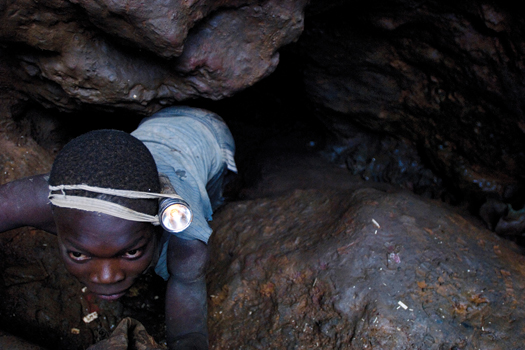
- Mark Craemer
- Deep tunnels, hewn from rock or formed by natural fissures, are worked by the smallest miners, including children as young as twelve, using hand tools. Inside the mines, it is hot and hard to breathe, and workers can see only by the dim glow of flashlights tied to their heads.
I knew that Jean Claude claimed ownership of his mine shaft because he had boasted as much to me, after I had caught him, surrounded by rifle-toting underlings, scolding an elderly army officer from a separate brigade who had just taken me on a tour of his own pit—newly acquired, he’d said, for a small fee to a tribal chief.
With great fanfare, a uniformed escort brought me down to Jean Claude’s shaft, handed me a headlamp grabbed from a miner’s head, and led me inside.
Dozens of small headlamps lit the way down. Miners gripped the walls with their legs. They scratched and gently picked into the stone. Far from the heat and the noise, their underworld held a kind of artistry. Stillness and concentration prevailed.
All told, ten to fifteen thousand souls from hundreds of miles across Congo—ex-criminals, unreformed child soldiers, evangelical pastors, donut sellers, and unemployed dreamers—dared the rule of military brawn for a chance to scratch a living from Bisie’s rock.
Why did they come if they knew the conditions they would face? I put the question to Samba Tabu, MPC’s Congolese attorney who manned the company’s outpost.
Rangy and clear-eyed, with a wide forehead and a long nose, Samba had the patrician air of one born and bred into the thin sliver of Congo’s intellectual and political class; he came from the relative affluence of the mineral-rich southern province of Katanga. He acted as a sort of Virgil, guiding me through the red mountain’s layers of hell. He bid me watch as a listless, elderly-looking man bounced along in a sled, used for tin transport, on another man’s back. They were headed from the miner’s camp, back down the mountain, toward the forest. “That would make a great photo,” Samba said. “Back in MPC’s day, we would have helicoptered that man out to Goma and in forty-five minutes he’d have been in the nearest hospital. Instead they have to walk him back through the jungle. It’s insane.”
Photographs snapped by MPC staff since 2006 document miners who claim that they have been beaten bloody at the hands of soldiers of the Eighty-fifth. One man has his forehead split open, the pockets around his eyes are swollen red, the flesh from his legs is peeled raw as if he had been whipped, and baseball-size bruises across his shoulders and temples suggest a smashing by something solid and forceful. Samba pointed to a wooden sign hanging askew just outside the miners’ camp. It had been smashed a week earlier by a mob of owls who had risen up in a fury and chased the soldiers off the mountain. The riot was triggered when soldiers broke the leg of a miner who refused to pay a five dollar fee for participation in a compulsory census.
Again, I asked, then why come at all? He answered by describing the case of Musa Assini, a pit owner with a degree in engineering who had dropped by earlier that day. Assini’s predicament went something like this: When his tunnel veered into the pit belonging to an army major, he was ordered to dig to the left. When he dug to the left, he collided with a shaft owned by a police lieutenant. This would have posed few problems were it not for the fact that the precise spot of collision yielded a particularly fine concentration of cassiterite, and the police commander, Assini said, was determined to have his cut.
“Ah, but I have a protector, higher even than the police chief,” Assini had said. His patron, he said, was the prosecutor general of North Kivu province.
But the man’s revelation of another tentacle of corruption stretching from Bisie to the highest reaches of Congolese officialdom struck Samba as small fry. (He made a sport of mapping the ever-changing web of patrons with a hand in Bisie’s tunnels.) What shocked him more was another admission: Assini had said he had been too busy making money for the past two years to bother seeing his wife and seven children. He had said it in passing, devoid of emotion.
“Do you find that normal?” he said. “He is a man without a heart. In Congo, we have a lot of people who are extremely wealthy. How does that serve them? Why do they keep searching for a piece of the moon?”
I left the next morning. Bisie’s cacophony melted into the cool shade of the jungle. Already it left a bitter aftertaste. The place was a microcosm of the country’s predicament: weak state institutions, entrenched corruption, and a shambolic army whose commanders were too busy preying on the land and its population to rout the region’s equally predatory rebel factions. It revealed also the hapless choices of a broken society. A pastor’s spiritual authority, a university degree—the entire intricate fabric of roles that weaves together any other society—had no meaning here. Naked venality had leveled them all into a bleak, Hobbesian struggle of might against might.
And then there was Samba.
However futile his efforts, he had said, he would lay the first brick. In the purity of his struggle for his country there existed a faith in the power of human agency. The sense of all that merged with the physical pain of every step. It shot through my heels, up my blistering Achilles, into the thighs, into the back. Ferdinand had insisted we traipse the twenty-six miles back in a single stretch. He was afraid of what night might bring. Our military escort, a young doe-eyed soldier, marched on ahead, light as an antelope. As night fell, I walked on, numb. I dared not stop or remove my gum boots for fear of looking at my feet. The blisters and swelling would render me incapable of walking for days.
But the porters laughed or tripped forward uncomplaining, heaving their heavy loads. They sang, told hours-long stories in Swahili, in Lingala, in a harmony of tribal dialects. The rich, cyclical cadences of their voices buoyed us like wings. In the dark, a dark so thick you could not see a foot ahead, they promised possibility.
Back in Goma, I tried to follow all those bags of tin ore flown out from Colonel Samy’s mine. Along a typically potholed avenue in the center of town, above a rim of barbed wire, the vast three-dimensional lettering of Sodexmines glinted gold on the side of the mineral trading house, a rare image of polish and functional stability—and mysteriously acquired wealth—in a city of broken facades and slapdash opportunities.
Crowds of young men idled on patches of scrub in front of its towering gates. When the gates cracked apart for the rare visitor in an SUV, the men leaped to their feet and mobbed the security guard, hands shooting into the air with identity cards or work licenses for a chance at a day’s worth of employment.
The directors of Sodexmines, one of Goma’s two most productive trading houses, claimed not to know the precise origin of their supply. They bought it from licensed middlemen, after weighing their clusters of bags on a vast scale. Agents from two separate branches of government hovered nearby checking the middlemen’s licenses.
Inside the firm’s warehouses, machines alternately washed and ground the rocks just enough to meet international standards for export that required a purity of 60 percent tin ore. Then they trucked it to Mombasa, Kenya, where it was shipped to Belgium and on to smelters in Asia. Geographically, said Omar Ramazani, the company’s director general for eastern Congo, the bulk could come from any of the mines that dot Walikale, or from the provinces of Maniema or Katanga, the less volatile mineral-rich province just north of Zambia that is favored by international companies.
But the evidence of Sodexmine’s main source of supply was piled into a mountain of rusty iron ore, rising high above the wall and spilling across half the courtyard. Of all the varieties of Congo’s cassiterite, only the rock at the tin-ore mine of Bisie contains a quantity of iron that approaches 20 percent. The iron accounts, in part, for the mountain’s striking rusty color. Streets away, at MPC’s headquarters in Goma, small plastic bags of cassiterite in dozens of shades, from pale gray to deep brown, sat on sheets detailing their origin and chemical composition. In June 2010, when asked if minerals to make the iPhone 4 came from the eastern Congo, Steve Jobs said, “We require all of our suppliers to certify in writing that they use conflict few materials. But honestly there is no way for them to be sure. Until someone invents a way to chemically trace minerals from the source mine, it’s a very difficult problem.” But even to the naked eye, Bisie’s sample stood starkly apart from the rest—and offered clear evidence of the main source of Sodexmines’s supply.
Congolese officials have in the past few years attempted to clean up a trade that they understand to be the future of their country. The effort has helped draw almost $3 billion in private foreign investments since 2003, most of it from US or Chinese companies in the pacified, southern mineral-rich province of Katanga. As long as disorder reigns in the east, however, Congolese officials who acknowledge the problem that Bisie represents say there is little they can do.
Months later, the fighting in Congo had shape-shifted anew with the arrest in Rwanda of rebel leader Laurent Nkunda and the launching of a brutally anarchic joint offensive by Rwanda and Congo against the Rwandan Hutu militia. MPC continued its efforts to spark action from Kinshasa while public shaming of Congo’s mining sector by various nonprofits and a series of visits from high-level authorities to the area forced the eviction of Colonel Samy and his Eighty-fifth brigade. On August 7, 2009, just three weeks after Global Witness published an extensive report on the militarization of the mining sector, Prime Minister Adolphe Muzito, the minister of mines, and other senior officials, visited Walikale and issued instructions direct from President Joseph Kabila that all military personnel should vacate mining sites. The eviction turned on sending in the 212th, but Congo being Congo, the unit merely picked up where the Eighty-fifth left off. Now, in Samy’s place reigns Colonel Etienne Bindu, the head of the Eighth military region who for years has had one hand in his private mine shaft and another on the Saturday barrier shakedowns.
Adolphe found his way to a refugee camp in Goma where he promptly fell ill with malaria. Gaston returned to the nonprofit he had founded in his hometown which specialized in denouncing abuses by local authorities; within months, he fled to Malawi amid death threats. Samba and I kept up our conversation. Often he would phone in the middle of the night. By flashlight, he would be plotting his campaign ahead of the 2010 local elections. He would run as a deputy for North Kivu province in the National Assembly in Kinshasa. We talked of corruption, and of the redemption of the country’s soul.
“I know there are honest people in the Assembly,” he told me one night. “There might be dozens of them. I could be that last drop of water to turn them into an ocean.”
One night he phoned me in the feverish throes of a slow-acting poison. Karuho, he called it, a Rwandan import derived from the skin of a chameleon mixed with tree bark. It was burning into his stomach and parching his throat. One of his MPC colleagues had died from the poison a week earlier, he said. Traces of it were found on his cell phone. It was the first time Samba told me that he was scared.
But his vision wouldn’t change, he said.
“I’m more realistic now,” he said. “I have to be.” He would be careful about shaking hands and lending his cell phone to distant cousins. He would have to scale back his ready generosity with the extended members of his family, his tribe. When I pointed out that he seemed to have uncles scattered everywhere, he replied with a chuckle, “You know, we’re African.”
But he would redouble his energy, he said, basing his campaign around what he saw as a critical need for education. He would preach civic values, and with it, love of country, to the farthest reaches of North Kivu province. I’ve often wondered how easily his vision could die in the jungle, forgotten as quickly as a tin porter press-ganged in the night. But perhaps political redemption, even in the midst of bloody Machiavellian politicking, begins always as someone’s fragile dream. Bisie, he said, will return to the rule of law—a small victory, perhaps, but on it hinged the future of his nation.




